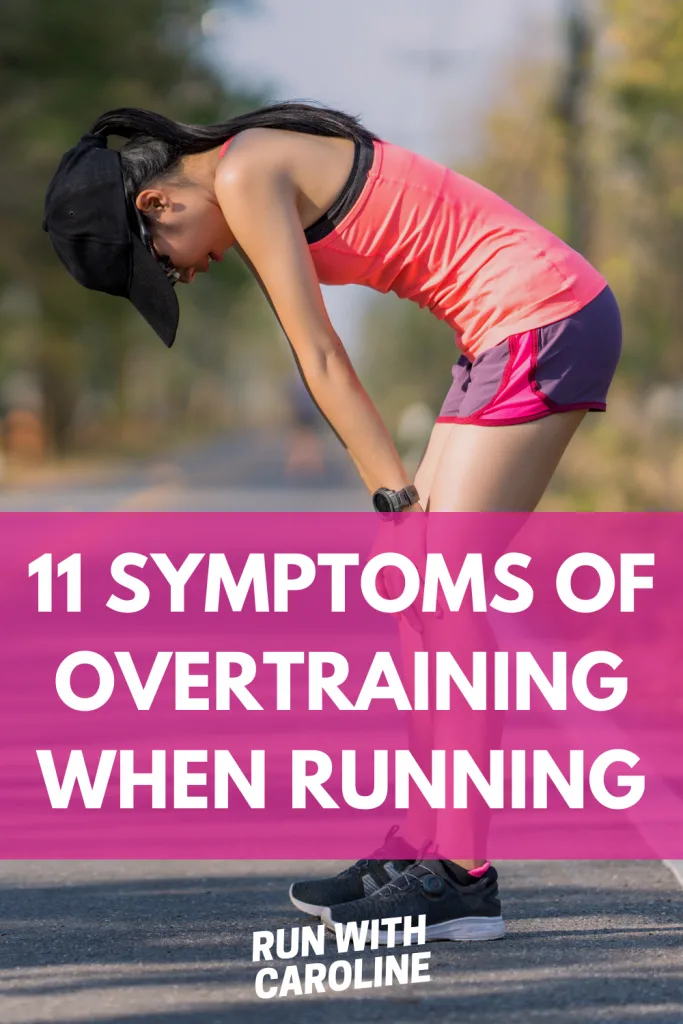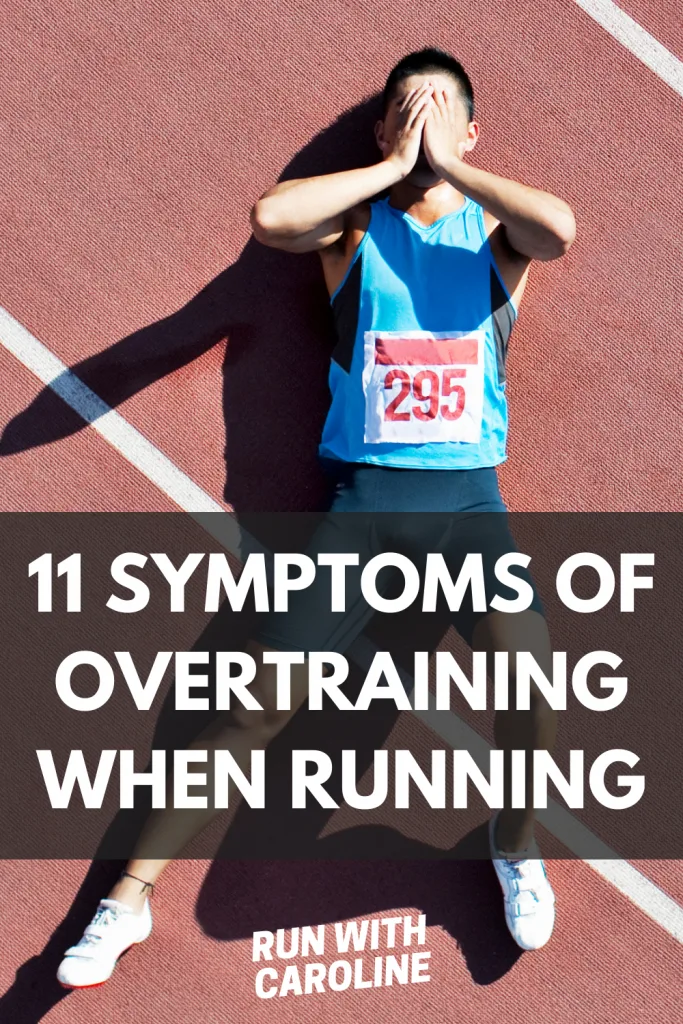When your body is put under too much stress, or when you don’t allow enough time to recover between runs, it can start to show signs of fatigue.
Tiredness and fatigue can lead to reduced performance in the long term.
So how do you spot the signs of overtraining when running? Are there any symptoms?
Unfortunately there aren’t any clear cut signs that you may be overtraining.
Stiff muscles, loss of energy, low mood, whilst these can all be attributed to overtraining, there aren’t any tangible ways to identify or measure whether you are overtraining.
This is why it’s so important to recognise subtle signs and symptoms that you may be pushing it too far during your training.
The bottom line is that fatigue and underperformance are common in a lot of runners.
By understanding the signs and symptoms of overtraining when running, you will be better equipped to evaluate and manage these symptoms.
In this guide we’ll explore:
- What is overtraining syndrome?
- What causes overtraining syndrome?
- Who is at risk of overtraining syndrome?
- What are the warning signs of overtraining when running?
- Female overtraining symptoms
- How much time you should allow for rest and recovery
- How to prevent overtraining syndrome
Ready?
Let’s get started!

What is overtraining syndrome?
According to a 2012 study, overtraining syndrome (OTS) is a “maladapted response to excessive exercise without adequate rest, resulting in perturbations of multiple body systems (neurologic, endocrinologic, immunologic) coupled with mood changes.”
Despite what many people think, overtraining syndrome (OTS) is not solely caused by a high volume of training.
It’s more to do with ineffective recovery between runs on a repeated basis.
In more recent years, overtraining syndrome has been redefined as Unexplained Underperformance Syndrome (UPS) which is described as a persistent, unexplained dip in performance that continues even after you’ve had what you think is sufficient rest.
In other words, if you continue to train without effective rest and recovery, you could end up with overtraining syndrome.
Related: How to recover after a half marathon
What causes overtraining syndrome?
Before we look at the signs and symptoms of overtraining when running, I want to review some of the common causes of overtraining.
Whilst there are types of runs and workouts that make you more susceptible to overtraining, the key underlying cause is always ineffective rest and recovery.
Here are some common causes of overtraining when running:
- Progressing too quickly in a training cycle
- Not giving your body enough rest in between training cycles
- Too many high intensity training sessions
#1 Progressing too quickly in a training cycle
If you progress too quickly in your training plan, or try to break too many personal bests in one training cycle, this can make you more susceptible to overtraining.
#2 Not giving your body a rest in between training cycles
Inadequate rest and recovery between training segments is a common cause of overtraining.
If you’ve recently completed a 10k race, for example, allow yourself at least one week of recovery before returning to running.
#3 Too many high intensity training sessions
Too many high intensity training sessions such as speed training or hill repeats is also a common cause of overtraining.
Whilst high intensity sessions are beneficial to help you increase your speed and stamina, too many of these sessions can be detrimental to your performance in the long term.
Related: How to run faster for longer: Top 5 training secrets

Who is at risk of overtraining?
When assessing whether you’re at risk overtraining, it’s important to understand the volume of training in relation to what’s going on in the rest of your life, particularly external factors and stresses.
For example: if you regularly put in 8 to 10 hour days in the office, then complete 2 hours of training on top of that, this is going to have an impact on your performance.
Increasingly, runners juggle running alongside work and family commitments. Whilst this is entirely possible, it is a fine balance between training and overtraining.
The bottom line: ineffective recovery and external stresses make you more susceptible to overtraining.
The following types of runners are more at risk of developing overtraining syndrome:
- Elite runners
- Long distance runners
- Runners who have a Type A personality
- Runners who regularly neglect rest and recovery days
- Runners who lead a busy or stressful lifestyle
- Runners who run as well as training for other sporting events
- Runners who undertake periods of high volume and repetitive training
#1 Elite runners
It is thought that around 65% of elite runners develop symptoms of overtraining syndrome at one point or another in their sporting careers.
To combat this, many elite athletes dedicate 80% of their training time to easy runs, rest and recovery.
#2 Long distance runners
When training for long distance running, it’s all too easy to become consumed by your training plan.
Training for a distance like a marathon or ultra marathon takes considerable time and effort, but if you don’t allow adequate time for rest and recovery amongst all the training sessions and workouts, you could risk overtraining.
#3 Runners who have a Type A personality
People with a Type A personality are characterised by “a constant feeling of working against the clock and a strong sense of competitiveness.
Individuals with a Type A personality tend to experience a higher stress level, hate failure and find it difficult to stop working, even when they have achieved their goals.
#4 Runners who regularly neglect rest and recovery days
Rest and recovery, whether you’re running a 5k or ultra marathon, is essential to any well-rounded training plan. If you neglect it, you risk overtraining.
#5 Runners who lead a busy or stressful lifestyle
As discussed earlier, if you lead a busy or stressful lifestyle, this will likely have a detrimental impact on your performance on the race track.
#6 Runners who train for other sporting events
It’s not uncommon for runners to train for other events like duathlon and triathlon which combine running, cycling and swimming.
The training required for these events is particularly grueling, and make runners who take part in them more susceptible to overtraining.
#7 Runners who undertake periods of high volume and repetitive training
A lack of variety and lack of recovery in a training plan makes you more susceptible to overtraining. Even more reason to mix it up!
Related: How to fit a run into a busy schedule

11 signs of overtraining when running
As I mentioned earlier, it’s actually quite hard to determine whether you’re overtraining, but there are signs of overtraining when running that you can look out for.
Over running side effects vary for each individual runner, but here some common symptoms of overtraining when running:
- High heart rate
- Low mood and/or irritability
- Frequent illness or infection
- Sleep issues
- Extended periods of muscle soreness
- Heavy legs when running
- Changes in appetite
- Performance plateau or decline
- Increased need to sleep
- Loss of motivation
- Persistent fatigue
#1 High heart rate
An elevated heart rate or reduced heart rate can be an indicator of overtraining or exercise-related stress. If your heart rate exceeds 5 to 10 beats per minute, then it could be a sign to take time away from running.
Note: a high heart rate can also be caused by a number of health-related factors, so if you’re worried, always get it checked out by a medical professional.
#2 Low mood and/or irritability
Overtraining can lead to a decrease in hormone production which can have an impact on your mood. If you regularly feel stressed or have a low mood, then it may be sign that you’re overtraining.
#3 Frequent illness or infection
Your immune system is impacted when you have overtraining syndrome. If you find yourself getting sick more often with the cold, flu or other viruses, then it may be your body’s way of telling you that you’re pushing yourself too hard.
#4 Sleep issues
Disturbed sleep patterns are a common symptom of overtraining. If you wake up earlier than normal, or have trouble staying asleep, then it could be a sign of overtraining.
#5 Extended periods of muscle soreness
When you have overtraining syndrome, it takes your body that much longer to recover from exercise and activity like running.
For example, you may find it’s taking you weeks instead of days to recover from a run.
#6 Heavy legs when running
If your legs feel like tonne weights on your run, then it’s a sign that you need to prioritise recovery between your runs.
One of the causes of heavy legs when running is overtraining. The number of miles you’re running each week contributes to that ‘heavy legs’ feeling.
#7 Changes in appetite
Loss of appetite can be a sign of overtraining. Studies show that overtraining and prolonged, high volume training can induce a physiological disturbance in the appetite regulatory system.
#8 Performance plateau or decline
Dips in performance or even a complete plateau in performance, after adequate rest are common signs of overtraining.
If you find your performance isn’t as consistent as it once was, it may be a sign to optimise rest and recovery.
#9 Increased need to sleep
If you feel tired all the time, or have an increased need to nap during the day, this is attributed to overtraining.
#10 Loss of motivation
There are probably days when you have zero motivation to go for a run. Whilst this is a common feeling for a lot of runners, a persistent loss of motivation may be a sign that you’re burning the candle at both ends.
#11 Persistent fatigue
Chronic fatigue, otherwise known as Chronic Fatigue Syndrome (CFS), is a complicated disorder characterised by extreme fatigue that lasts for at least six months that cannot be explained by an underlying medical condition.
The fatigue worsens with physical or mental activity, but crucially doesn’t improve with rest. If you feel you have symptoms of Chronic Fatigue Syndrome, then seek advice from a medical professional.
Related: 6 ways for successfully running with a chronic illness
Female overtraining symptoms
Overtraining can present itself differently in female athletes. Typically one or more of the following symptoms are precursors to overtraining syndrome:
- Irregular periods or menstruation
- Weight fluctuations
- Excessive exercise
- Anemia
- Hormonal and mineral changes
- Anorexia and bulimia nervosa
If in doubt, always speak to a medical professional.
Related: Taste blood when running? 7 causes + how to prevent it
How much time should I allow for rest and recovery?
If you notice five or more of the above overtraining symptoms, then it’s a sign to take a break from running for a short period to allow your body to rest and recover.
You may also want to revisit your training plan.
Ask yourself: is there any way you can tweak it to optimise rest and recovery times whilst you get back on your feet? Your body will thank you if you take it easy for a while.
There is no exact science behind how much time you should take to rest and recover. It is very much dependent on the severity of your symptoms.
Many researchers suggest at least three weeks to allow your body to rest up fully. If your symptoms are particularly bad, then a period of rest of between 6 to 8 weeks is best.
Related: 6 delicious smoothie recipes to optimise recovery
How to prevent overtraining syndrome
Now you know the warning signs of overtraining when running, here are some simple strategies to help prevent overtraining syndrome:
- Warm up properly before a run. A warm up is essential to any run. Make sure you dedicate time before your run to get it prepared for the run ahead. Dynamic stretches and running drills are great additions to any warm up.
- Cool down after a run. The main purpose of a cool down is to boost muscle recovery after a run. A good cool down will go a long way to help prevent muscle stiffness and soreness after a run.
- Fuel your body properly. Focus on getting your daily dose of nutritious food and stay hydrated in between runs.
- Stretch. Stretching is not only reserved for the warm up and cool down. Regular, daily stretching is recommended for anyone who wishes to improve their flexibility and mobility.
- Foam roll. Foam rolling is a great way to reduce muscle soreness after a run and improve your flexibility and mobility.
- Get plenty of sleep. A good night’s sleep does wonders for your health. If you regularly struggle to get a peaceful night’s sleep, then it’s time to reassess your bedtime routine. Aim to get at least 8 hours of sleep each night.
- Consider walking instead of running. Yes, you heard that right! Walking has many benefits and it is a great, low impact alternative to running.
- Book yourself in for a massage. A sports massage is a great way to ease some of the aches and pains that you may be feeling in your legs following a particularly gruelling training plan.
Related: What to eat before a run
More rest and recovery tips:
- Benefits of foam rolling: How to foam roll properly as a runner
- 6 delicious smoothie recipes to optimise recovery
- How to recover after a bad run: 8 ways to bounce back
- How to recover after a long run
- 5 things I wish I’d known before returning to running - March 3, 2024
- Running 20 minutes a day: Benefits + how to start - January 27, 2024
- How to run your first 2 hour half marathon - January 16, 2024
